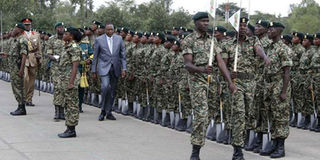Autonomous NYS good for ‘Big Four’ agenda and Vision 2030

President Uhuru Kenyatta inspects a pass-out parade of the National Youth Service recruits at NYS College in Gilgil, Nakuru on April 21, 2016.PHOTO | SULEIMAN MBATIAH | NATION MEDIA GROUP
What you need to know:
Amid the streamlined NYS training and empowerment programmes, servicemen and women and recruits will be more involved in social order and defence programmes as a reserve unit for Kenya Defence Forces and Kenya Police Service.
The discipline and spirit of patriotism for which NYS is renowned will be put into effective use for the service of Country as the youth get the opportunity to claim their dividend.
With a large portion of the population being youthful, the space for youth contribution to the President’s ‘Big Four Agenda’ and the Kenya Vision 2030 cannot be gainsaid.
Since its inception in 1964, the National Youth Service (NYS) has carried the youth empowerment torch. In the recent past, however, NYS faced major operational and managerial challenges that affected the implementation of its social programmes and service delivery. This occasioned loss of funds, dented image and erosion of public trust, threatening not only the vision but its very existence.
NYS COUNCIL
With the ongoing restructuring, however, that tainted past is set for the back burner.
The government has been keen to reform and get the service back on track. Mid last year, the Ministry of Public Service, Youth and Gender Affairs, under which NYS falls, formed a team of experts to come up with sustainable solutions to the challenges in the service.
Most of the challenges were found to be structural and operational. Subsequently, legal and structural changes have been made with the passage of the NYS Act 2018 in October and the gazettement of the NYS Council on February 8.
With a new council takes over oversight, a role previously performed by government, the unfolding changes are fundamental. The incoming council’s work will, essentially, remove the hand of the ministry from the affairs of NYS.
The first challenge it will address is NYS’s organisational capacity and culture. The analysis showed major faults in the oversight for NYS, owing to lack of segregation of roles between the ministry and the service. An independent oversight board for NYS will effectively make it a body corporate with a director-general who will be the chief executive officer (CEO).
LOOPHOLES
The second will be streamlining the supply chain management, which was found to have many loopholes for corruption. NYS was running on ineffective procurement controls and the board will need to put in place effective structures and procedures that do not allow collusion with suppliers.
The third challenge will be streamlining of financial management systems. The analysis found that there was no budgetary delineation and NYS often reverted to the regular budget to finance emergency responses. There were no revenue management systems and controls and officers preferred to use manual payment. That led to weak controls in payments and linkage of controls from procurement, delivery and payment.
The fourth will be putting in place accountability and monitoring systems. The study identified a defective reporting structure for the internal audit function and absence of a risk management framework. Further, there was neither a monitoring and evaluation framework nor an asset mapping and institutional valuation, exposing the service to plunder.
The fifth challenge will be automation of systems and integration of technology. The analysis revealed that 90 percent of operations at NYS were manual, adversely affecting operational efficiency. This is not only a sign of institutional stagnation but also evidence that the service’s ICT investments were mismatched to its operational needs.
EMPOWERMENT
There was also suboptimal use of Ifmis-supported financial management and procurement process. This was noted to be a major risk area, which partly explained the reported procurement-related corruption at NYS.
With 22 stations around the country, a comprehensive and integrated computing system is required for information processing, data management, communication and operational control systems.
Under the NYS Act, the board assumes immense oversight powers that include recruitment of professionals, policy formulation, discipline and monitoring, among other oversight functions.
The service will effectively run as a private entity with a CEO reporting to the board. Besides NYS getting professionalised, there will be better financial management and stronger governance structures and control systems in place.
With the Act, NYS will embrace more functions.
Amid the streamlined NYS training and empowerment programmes, servicemen and women and recruits will be more involved in social order and defence programmes as a reserve unit for Kenya Defence Forces and Kenya Police Service.
The discipline and spirit of patriotism for which NYS is renowned will be put into effective use for the service of Country as the youth get the opportunity to claim their dividend.
Prof Kobia is the Cabinet Secretary, Ministry of Public Service, Youth and Gender Affairs. [email protected]





